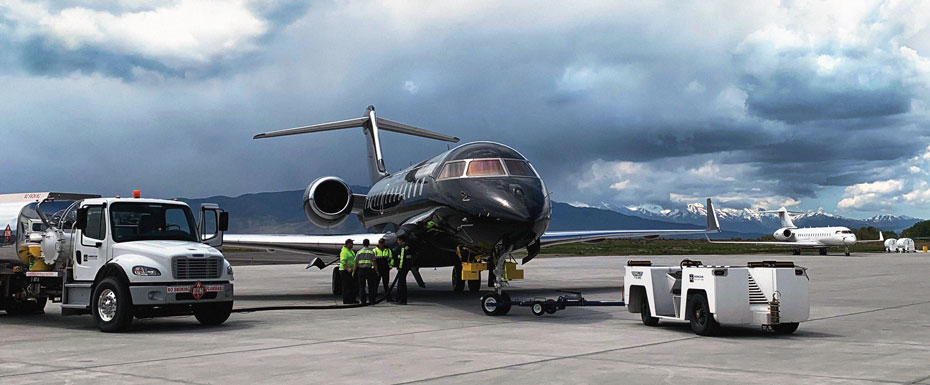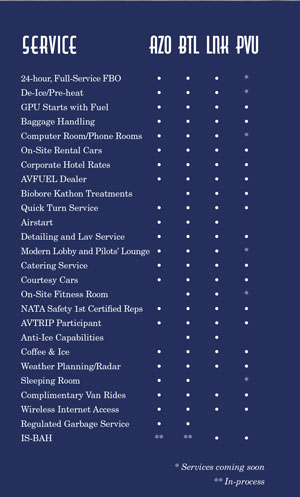
A commitment to safety is one of Duncan Aviation’s core business values. We are committed to making our facilities safe for our customers and our team members and to providing safe products and services.
In addition to enshrining these principles in our core values, the Duncan Aviation FBO (Fixed Base Operator) Services teams in Lincoln, Nebraska, and Provo, Utah, have taken the rigorous steps necessary to achieve Stage I certification from IS-BAH (International Standard-Business Aircraft Handlers). The Duncan Aviation FBO facilities in Battle Creek and Kalamazoo, Michigan, are currently working toward this certification.
IS-BAH certification means that the FBOs have met all international standards to promote and provide safe environments for customers and workers. Developed by IBAC (International Business Aviation Council) and the NATA (National Air Transportation Association), IS-BAH requires sustainable use of an SMS (Safety Management System). There are four pillars to an SMS: Safety Policy, Risk Management, Safety Assurance, and Safety Promotion.
“The reason for an organization to have an SMS is that it coordinates all safety-related activities to help us better manage hazards and continually improve the safety of our products,” says Mike Brown, Manager of Audit Programs. “We work in a highly visible industry where you can never completely eliminate hazards. An SMS lets us, as a company, develop plans and methods to learn from history, mitigate risks and hazards, and make informed decisions.”
With the help of his team, Manager of FBO Services Troy Hyberger undertook the process to achieve this certification for the Lincoln facility in 2018. In May 2019, the new full-service Duncan Aviation facility in Provo, Utah, led by Manager of FBO Services Bob Cornett and his Line Services team, also passed the Stage I IS-BAH audit.
Stage I IS-BAH certification confirms the existence of an active SMS, that safety management activities are set up, and that all supporting standards and infrastructure have been established. Audits are conducted to ensure conformance with the certification requirements.
When auditing FBOs for Stage I IS-BAH certification, the auditors look to make sure the company has General Operations Manual policies in place, and that team members are following them. They also make certain the company has an SMS in place, and that it’s in use at the facility. Another key function of the audit is to make sure the team members in Line Services all know what the policies are, where to find them, and how to react if there’s an incident. Auditors talk to members of the team and ask questions regarding Duncan Aviation policies and procedures. In order to pass the audit, team members, supervisors, and managers must all know and be able to articulate this information.

“Duncan Aviation has always been serious about safety and customer care in all aspects of our aircraft service,” says Troy. “The rigorous standards established through the IS-BAH program set a high bar for the industry. With more than 60 years of experience, Duncan Aviation was already meeting the majority of those standards. To earn the accreditation, we took all of our tribal knowledge and turned it into official, written policies that can be tracked and measured. Customers who look for the IS-BAH rating will also know what to expect when they utilize our services.
“As a large MRO provider, attaining IS-BAH certification is a little different for us,” Troy continues. “For example, we often tow aircraft in atypical configurations, like with the tail removed or no interior in place. Best practice policies for all of the variants are documented, tracked, and consistently applied.”
The policies document the routine, daily tasks that the team members in the Line Services Department perform every day. They also provide a road map for how to handle any incidents.
“The best part of preparing for the audit was that it raised awareness and put us all in a safety-conscious, safety-aware frame of mind,” says Troy. “For instance, if chocks had been left on a ramp after an airplane left, we’d want our team members who may be driving by to notice them and remove them immediately. The whole point of the audit and certification is to raise situational awareness, to make sure team members’ awareness is functioning at a higher level so they can anticipate problems and find ways to reduce potential incidents.”